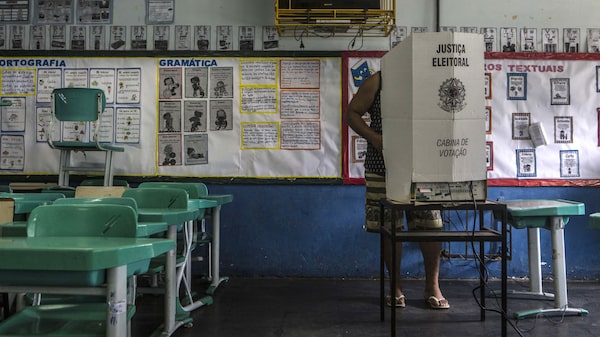Bloomberg — Brazilian stocks have outperformed global peers this year, and some investors say more gains are likely in store as neither of the two candidates vying for the presidency in the first round of voting Sunday is expected to jeopardize the country’s fiscal accounts in the short term.
But the consensus on the outlook for Latin America’s largest equities market tends to stop there as the two leading candidates -- former President Luiz Inacio Lula da Silva from the Workers’ Party and incumbent President Jair Bolsonaro -- have different views on several issues, ranging from the privatization of state-controlled companies to the focus on a transition to more sustainable energy sources.
While Lula has been more vocal about using state-run companies to help boost the economy, Bolsonaro intends to keep pushing forward with a privatization program he started during his first term and possibly include oil giant Petroleo Brasileiro SA (PETR3, PETR4).
Read more on Brazilian elections:

With just days to go until the first-round vote, Lula holds the lead over Bolsonaro in almost all polls. The leftist leader is also ahead in simulations for a run-off election, which is slated for Oct. 30 if needed.
A representative for the Lula campaign declined to comment. A representative for the Bolsonaro campaign didn’t respond to a written request seeking comment.
Brazil’s Ibovespa Index is up 7.1% in dollar terms this year compared with a 23% drop in the US S&P 500 Index. Valuations still look historically attractive, investors said. “Brazil is cheap” said Greg Lesko, a portfolio manager at Deltec Asset Management in New York.
Here’s what to watch for ahead of the vote:
Homebuilders
Efforts to shore up Brazil’s low-income housing segment “should continue regardless of political outcomes,” Citigroup Inc. analysts including Andre Mazini wrote in a note earlier this month. That means builders with a focus on low income housing, such as MRV Engenharia e Participacoes SA (MRVE3) and Direcional Engenharia SA (DIRR3), could see renewed interest. Another boost to the sector could come from an expected end to Brazil’s tightening cycle. Brazil’s central bank left its benchmark Selic rate unchanged at its September meeting after a 1,175 basis-point jumbo hike.
State-run companies
While Lula has signaled that Petrobras could embark on a fresh cycle of investments in lower-return assets such as refineries, Bolsonaro said in August that his economic team had the green light to propose and plan a potential sale. The government controls Petrobras with a 50% stake in common shares of the $77 billion company.
“I don’t think Petrobras is worth zero under a Lula government, and investors are aware his comeback is unlikely to represent a return for those Dilma years,” said Leonardo Rufino, a portfolio manager at Mantaro Capital in Rio de Janeiro. “But a higher level of political interference is expected.”
Consumer Discretionary
Veteran emerging-market investor Mark Mobius said “probably there’ll be a step-up in consumer spending” under Lula. The former President signaled that in addition to maintaining the current social program that pays 600 reais ($112) in cash handouts to low-income Brazilian families he would boost the amount by 150 reais per child under age six. Earlier this month, Bolsonaro too indicated that he intended to increase outlays made through his flagship Auxilio Brasil program by 200 reais to 800 reais a month to those who get a job while receiving the handouts.
Watch out to mall operators such as BR Malls Participacoes SA. Discount retailers and some companies that cater to low-income consumers, including Magazine Luiza SA(MGLU3), MercadoLibre Inc. (MELI), Lojas Renner SA (LREN3), could potentially benefit from higher consumer expenditures as a result of the stimulus programs, according to JPMorgan Chase & Co. equity strategist Emy Shayo.
Education
Shares of for-profit education companies such as Anima Holding SA (ANIM3) and Cogna Educacao (COGN3) have rebounded recently as Lula said he’ll boost the government’s education program, known as Fies, by granting fresh loans to students. Banco BTG Pactual SA analysts warned investors on betting against education companies.
Commodity exporters
If traders sense a more interventionist macro policy under Lula that raises the pressure on the Brazilian real, they might pile into the world’s second-largest iron-ore producer, Vale SA (VALE3), and pulp maker Suzano SA (SUZB3), which get a considerable part of their revenue in US dollars.
ESG
Lula has signaled the transition to green energy should be a key pillar of his economic program. This might lure some investors who got spooked by Bolsonaro’s fiery rhetoric on topics ranging from the Amazon rain forest to the Covid-19 pandemic. That means companies such as waste management firm Ambipar Participacoes e Empreendimentos SA could perform well, and more broadly, that large-cap stocks might benefit from increased inflows.
“A Lula administration is perceived to be comparatively more committed to an ESG agenda, which could eventually pay foreign policy dividends,” Goldman Sachs Group Inc. economist Alberto Ramos wrote in a note.
Read more on Bloomberg.com




